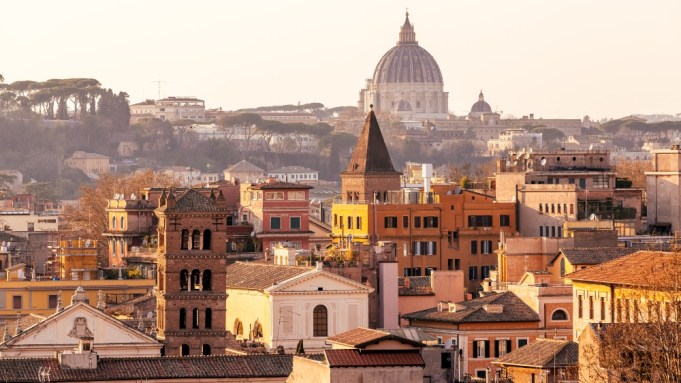With Brexit causing bankers to move out of London and into other European cities, the luxury real estate market in Milan has been booming. Yet, buyers looking for less expensive properties (and less competition) are starting to search in a different Italian metropolis.
Rome is quickly emerging as a favorite of homeowners looking to score a deal in the wake of pandemic. The Eternal City has seen good recovery post-lockdowns, with prime residential sales volume increasing by 31.4 percent from 2020—its highest level since 2007, according to Bloomberg. In comparison, Milan, while being Italy‘s fastest-growing financial hub, only experienced a 24.4 percent increase in volume in the same period.
The capital can thank its appealing character and relatively low prices for swaying house hunters toward the city. In sought-after Roman neighborhoods such as Trastevere or Garbatella, for example, the average luxury home is priced at $6,500 (about €6,000) per almost 11 square feet (one square meter)—half the cost of similar properties in Milan. And it looks like the aforementioned persuasive combination is getting results: One in three potential Italian high-end buyers searching for active listings online were looking for properties in Rome, according to a report from Immobiliare.it, a high-traffic property website in Italy, and LuxuryEstate.com.
Rome is also undergoing a series of pivotal changes as it prepares for a flurry of activity, all of which will attract for visitors and buyers to the city. The Eternal City is playing host to the highly anticipated 2023 Ryder Cup (the first time the golf tournament has been held in Italy); planning to celebrate a Roman Catholic Jubilee in 2025, as well as 2,000th anniversary of the death and resurrection of Jesus Christ in 2033; and has thrown its hat in the ring as a candidate for the 2030 World Expo. All these events make the capital look rather attractive to investors, who are betting big with luxury hospitality brands such as the Four Seasons, and real estate firms, which are sweeping in on the city’s large inventory of underdeveloped properties in well-located areas.
Yet, acquiring property in Rome can have its fair share of red tape, thanks to the complex process of properly identifying the building and its history, which is required by law with a real estate purchase. That combined with the city’s high amounts of traffic and a lack of public transport could be a deterrent to some buyers, though the national government is planning on improving rail ways, developing subway lines and focusing on urban renewal overall as part of its massive National Recovery and Resilience Plan. Even with these drawbacks, more wealthy Italian citizens are investing in larger homes in the aftermath of the pandemic.
“The mood has changed, luxury hospitality is coming massively, there is a lot of liquidity available for prestige residencies and many opportunities to regenerate areas close to the center in order to host high-quality offices, student and senior housing,” Domenico Bilotta, managing director of InvestiRE SGR, told Bloomberg. “What has been missing so far compared to Milan—and is still a deterrent for international funds—is a long-term vision from the local administration on how to reshape some parts of the city, clear plans on how to make the most of existing buildings and urban spaces.”
Authors
-


Dana Givens
Dana Givens is a former digital staff writer for Robb Report. Before joining the team, she was a seasoned freelancer covering travel and lifestyle topics for outlets such as Business Insider, Fodor’s…



